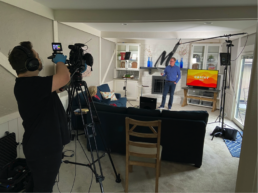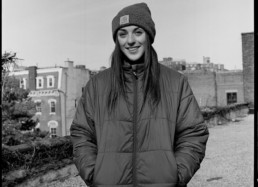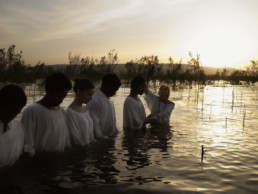Faith in Women
Faith in Women:
COVID-19 forces a faith-informed reproductive justice nonprofit in Mississippi to work towards online organizing in one of the most unequal states for women in the nation.
Kate Cammell | kac2261@columbia.edu
In April 2018, Reverend Anna Flemming-Jones and Ashley Peterson arrived for a workshop on compassionate care at the opulent Hilton Garden Inn in downtown Jackson, Mississippi, the former King Edward Hotel – now a state historical landmark and political center. There, beneath the high ceiling, crown moldings and spiraling marble staircases, Rev. Flemming-Jones and Peterson joined more than two dozen activists and clergy from around the country to discuss and practice ways to tend to the needs of their congregants. The duo are the program coordinator and executive director, respectively, for Faith in Women, a nondenominational religiously-informed reproductive justice nonprofit working across the state of Mississippi. Flemming-Jones and Peterson co-led the workshop on how to be, as their blog put it: “both a compassionate presence and prophetic witness for reproductive health, rights, and justice in their communities.”
In one exercise during the training, participants had to arrange themselves on a reproductive health and justice spectrum. As different issues like abortion or birth control access were discussed, they had to position themselves in the room, moving to spots along a line of strong disagreement to strong agreement. It was one of Rev. Flemming Jones first events with the organization and one of the first times she remembers finding community. She noted, “I remember realizing that I was a lot more liberal than I had understood myself to be. It felt subversive to be in a training that mentioned abortion rights in such a conservative city and state.”

Peterson added, “Being a progressive person in Mississippi is often an isolated and isolating experience. In coming together for training sessions or advocacy events someone might experience strength in numbers for the first time.”
Now, as COVID-19 forces people to stay home or change how they can legally gather, Rev Flemming-Jones and Peterson are reimagining how to achieve their mission of bringing together a community centered on bodily autonomy together in an era when many people have little control over both the movement and wellbeing of their bodies. Faith in Women’s work was already challenging to begin with; the organization fights for reproductive justice in a state where topics like abortion and comprehensive sex education continue to be taboo for many people, and where a history of racism has created some of the greatest health disparities in the nation.
Mississippi is the worst state in the country in health affordability, prevention and treatment, according to the Commonwealth Fund, a nonprofit conducting independent research on national healthcare issues. More than 58,000 Mississippi women, or a quarter of the state’s female population, lack access to insurance or Medicaid coverage, jeopardizing their access to reproductive health services. The state has the third-highest teen pregnancy rate in the nation and a single licensed abortion clinic still operating.
The Institute for Women’s Policy Research (IWPR), which provides both letter grades and a numerical state ranking system of how women fare in each state with categories ranging from poverty to reproductive rights, ranked Mississippi as the worst state in which to be a woman navigating health, wellbeing and poverty. Its highest letter grade in any category is a C-.
However, Mississippi does appear at the top of one list. It’s tied with Alabama as the most religious state in the nation.
Peterson saw this as an opportunity. She was born and raised in Mississippi, where she noted matter-of-factly: “You can’t do anything without acknowledging that faith is going to play a huge role in the conversation.” The organization is a cultural liaison of sorts between church leadership and congregants, and between the religious and secular worlds. They know how to speak the language of each group and act as translators using words that resonate in both faith and secular advocacy spaces like “compassion” and “dignity.”
The organization started with an attempt to provide clergy with comprehensive sexual health resources for their female-identifying congregants. Having grown up in the Methodist church, Peterson knew that “many churches host one-off conversations with youth about the importance of abstinence, or even teach a denominationally-sanctioned curriculum, but very few churches treat sexual and reproductive health as part of the full picture of the spiritual lives of their members.” Instead, Faith in Women connects clergy to comprehensive curricula, like a program from the Unitarian Universalist Association’s Our Whole Lives.
Dr. Nakeitra Burse, a leading public health expert in Mississippi and CEO of Six Dimensions health consulting firm, noted that these health disparities have historical origins, which is why the intersectional and long-term cultural organizing work Faith in Women is doing is so important. “Faith is a big part of Mississippi's culture,” Dr. Burse continued, “We’re in the heart of the Bible belt, so the faith-based community is a very strong community in Mississippi. Those are the leaders that people look up to.”
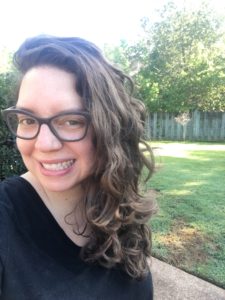
Faith in Women expanded from the educational sphere to organizing women across the state, advising policymakers and partnering with secular organizations, including Planned Parenthood, to provide a religious perspective to women’s healthcare issues. They’ll offer biblical interpretations and justifications for reproductive health and coach organizations on how to better connect with religious women.
The organization serves a core group of about 20 clergy members, nearly all women themselves, along with a wider community of just over 100 women and church leaders. Most of the clergy are located in and around Jackson with some in the Delta and Gulf Coast regions of the state, and mostly represent Protestant congregations, encompassing United Methodist, Cooperative Baptist, Presbyterian USA or Episcopal churches. However, a large part of Faith in Women’s work brings together diverse communities to provide space and opportunities for like-minded people, religious or not, to gather.
For progressive clergy who work in more fundamentalist religious spaces, especially in the Deep South, where even conversations surrounding reproductive topics from birth control to abortion are often socially unacceptable, these advocacy spaces are welcome respites. Rev. Susan Chorley, a Baptist minister who journeyed from Boston for the Space for Grace training session said, “The depth of the conversation among participants and the facilitation allowed us to create connection and community in a very short amount of time. I left the training feeling hopeful and invigorated by the work ahead of us.”
Now, downtown Jackson looks so abandoned that “The Walking Dead” could film in the empty streets, according to Rev. Flemming-Jones. As COVID-19 continues to sweep across the globe and many states are under stay-at-home mandates, organizing events like the compassionate care workshop are indefinitely on hold. Peterson said that nearly 90 percent of Faith in Women’s work took place in-person before the pandemic and the group is finding it difficult to recreate the level intimacy that is so crucial to their efforts on Zoom. The group’s primary work— organizing— is typically rooted in physical communion and drawing together diverse perspectives which they’re finding harder to coordinate online.
Reproductive justice is a framework that is based on an intersectional approach to sexual health equity. The term was coined in 1994 by a group of black women social justice leaders who gathered in Chicago and were later called Women of African Descent for Reproductive Justice. Forward Together, a social justice network, defines reproductive justice as, “all people having the social, political, and economic power and resources to make healthy decisions about their gender, bodies, sexuality, and families for themselves and their communities.”
This framework is crucial in Mississippi where black women face particularly adverse reproductive health outcomes, as do other communities of color and LGBTQ individuals. In just one glaring example, the mortality rate for black women is 40 deaths per 100,000 compared to 12.4 deaths per 100,000 for white women according to the Center for Disease Control and Prevention. Yet, in response to the state’s history of reproductive inequality, there is also a long history of social justice organizing, of which Faith in Women is now a part.
As COVID-19 causes this organizing work to shift, Peterson and Rev. Flemming-Jones are coming to terms with and uncertain future. Peterson lives in the coastal city of Biloxi, Mississippi about three hours south of Jackson, where Rev. Flemming-Jones lives. Pre-pandemic, Rev. Flemming-Jones felt their organizing events were “almost like a friendship movie when people feel all alienated and meet up and are like, aw these are my people.” As she spoke toddler arms reached into her Zoom camera frame. Peterson nodded her head in agreement adding, “that opportunity to just get together and be ourselves, that's what I'm really struggling to reconcile with this COVID situation.” Behind her, a hand-drawn rainbow arced across the whiteboard of her home office.
Now both women are busy juggling their full-time work and childcare from their respective homes. Peterson has a two-year-old son and Rev. Flemming-Jones has two sons, a six-month-old and two-year-old. Many women in their networks are mothers in similar positions. Peterson also said that “a very real and practical roadblock is that not everyone has access to stable internet or reliable computers/phones that can handle video conferencing. Especially in more rural parts of Mississippi, like the Delta, high-speed internet is harder to come by.” Another concern for the group is privacy as they talk about bodily trauma and sensitive topics online. Rev. Flemming-Jones added, “effective organizing in this realm comes from trusting relationships. Those kinds of relationships are so difficult to build online.” Faith in Women’s virtual organizing struggle reflects a broader challenge faced by many advocacy groups across the globe.
Peterson and Rev. Flemming-Jones know that reproductive justice might not be at the forefront of people’s minds because of the pressing concerns of illness and death amid the pandemic. They worry that the coronavirus crisis will only exacerbate reproductive health outcomes in the state. Peterson worries for Mississippi women trapped in abusive homes and young people cut off from “school- and community-based resources like confidential STI screening and testing, contraception, and sexual health information.” She continued, “The very technologies that we’re so dependent on right now, such as telemedicine, have always been heavily restricted in Mississippi when it concerns reproductive health. The danger now is that our state administration is able to pass further restrictions, such as designating abortion an ‘elective’ procedure, while people are distracted by the virus.”
Indeed, in late March Mississippi governor Tate Reeves called on state healthcare officials to stop performing abortions during the pandemic. Texas and Ohio officially banned abortions, calling them non-essential procedures. Though Mississippi’s clinic remains open and is continuing to perform the procedure, reproductive health advocates warn that restricting abortion access during this time creates a path toward abolishing it permanently. Rev. Flemming-Jones said, “The only way this pandemic might somehow be a cause for positive change would be if Mississippi expanded Medicaid. Which seems unlikely.”
Faith in Women is attuned to this changing landscape. Flemming-Jones and Peterson are talking with community members to hear what their current needs are and hoping to partner with a counselor in their network to provide free mental health services. And, while the conference rooms of the King James Hotel where they met in the fall sit empty, they’re figuring out a way to do similar workshop exercises on Zoom.
Pandemic Partnerships
Pandemic Partnerships
A Megachurch so comfortable online that it’s sharing its technological know-how with others
Kate Cammell | kac2261@columbia.edu
As churches remain shuttered in the wake of COVID-19, many have moved services online indefinitely. For some, it’s posed new technological challenges. But for Ada Bible, a 9,000-person megachurch in Grand Rapids, Michigan, the transition to virtual pastoring has been one of the more feasible parts of shifting operations.
Ada Bible has been live streaming their sermons since 2008 and it’s become an integral piece of their weekly worship model. The church has a sophisticated and salaried, eight-person production team, led by Service Programming Director, Jeff Abbott. The team is comprised of a technical director, production director, production coordinators, a live video director and a few weekend volunteers. Abbott said that “the pandemic didn’t change [Ada Bible] radically, our values stayed the same, [to] keep people connected to God and his church.”
Now they’re sharing their technological know-how with churches across the denominational spectrum. The church is donating equipment and their years of digital expertise to smaller congregations. They’ve purchased production kits for a handful of parishes that include a camera, live stream box and mics. Abbott noted, “Barriers that once separated us have helped to draw us together.”
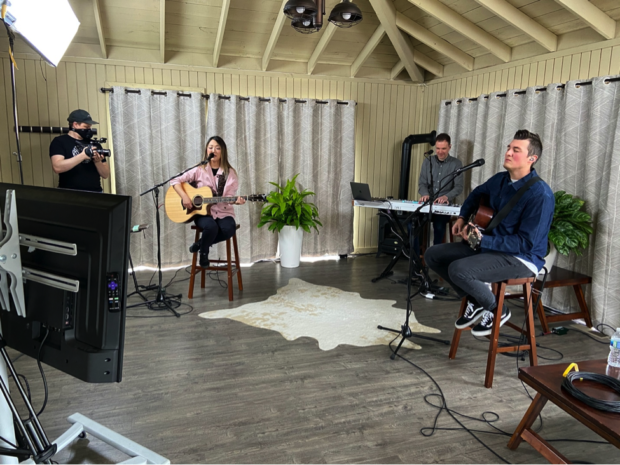
With a trimmed beard and shoulder-length brown hair pulled into a low bun, Kyle Pierpont has an uncanny resemblance to the Western iconography of Jesus. Pierpont is in charge of the church’s pastoral care and often opens the in-person services at Ada Bible’s Cascade Campus, one of the churches four physical locations throughout the 200,000-person city of Grand Rapids.
Before the pandemic, people trickled into the auditorium in cotton tees and with cups of coffee in their hands. There was limited regard for punctuality, and between the flashing lights and pop hymnals accompanied by electric guitar, the services also have the feel of a low-budget rock concert.
The casual vibe Ada Bible cultivated in person and virtually over the years is both strategic and rehearsed. Before the pandemic, producing a weekend service took 8 to 10 people and hours of meetings between the pastors, skill development sessions with the production team and rehearsals where the pastors’ movements were blocked out on stage. Now, Ada Bible is producing the services with just two crew members socially distanced in the homes of the individual pastors.
Pierpont recorded his first virtual message to his congregants while sitting in front of the bright green frond of a banana plant his wife got from Costco. His colleagues teased him about his tropical background after Ada Bible’s first fully virtual service stream aired on March 14, 2020. But Pierpont said the hardest part about going virtual isn’t filming recorded messages, it’s been the realization of how much he relied upon the physical spaces of the church for moments of connection with congregants.
Ada Bible’s multiple-site model is similar to many megachurches across the nation. The Beck Group, an architecture and real estate company, led one of the biggest surveys of megachurches. When the study was conducted in 2015, nearly 62 percent of megachurches had multiple locations and, like Ada Bible, 40 percent identify as nondenominational. Most megachurches draw their large crowds as the result of enigmatic pastors and Ada Bible is no different. Its membership grew rapidly in the 1990s and has coalesced around Jeff Manion, the church’s Senior Pastor. He’s known for a conversational and relational preaching style, using his hands to punctuate his message and often coming near tears as he talks.
As the church’s auditorium first began to fill to capacity, people had to spill through the doors into the church atrium. Pierpont said that instead of creating a bigger auditorium the church opted for the campus model because their concern was that if you build a bigger auditorium you have to keep it occupied. “If it ever doesn't fill up or struggles to stay full you struggle with morale issues, people wandering into a big room that feels empty even if there is a good amount of people,” he explained.
Before Ada Bible created separate campuses, leadership launched venues which were smaller rooms within the same campus building. Manion’s sermon was live streamed onto a screen from where he was preaching just feet away. There were some live elements like a host and live band, and church members could still see Manion in the hallways after the service.
Cheryl Jenkins, a 22-year member of Ada Bible and mom of three, was first attracted to the church because of Manion’s style. Jenkins began attending services in a venue known as The Studio when it opened. She said there was adjustment period at first, but the live elements helped bridge Manion’s virtual appearance.
Jenkins noted that, unlike the auditorium, The Studio has tables and chairs, and said: “It's one of the things that I, personally, like the most. It may seem kind of silly, but it's the truth! I enjoy the casual feel of being able to sit at a small table, while at church, take notes and have my coffee in front of me.” That relaxed feel is strategic.
Manion preaches at the original Cascade campus each week and his services are live streamed to the auxiliary locations and venues once on Saturday nights, and twice on Sunday mornings. Though it may seem unorthodox to drive to a building to watch a pastor preach live at another building, or from even just a few rooms over, approximately 5,000 people did it at Ada Bible every week pre-pandemic.
Aided by strong financial backing, many regards, Ada Bible runs like its own small production company. Now, the church is using some of its saved emergency funding to help others survive. In addition to purchasing production kits, they’re helping churches pay rent or salaries they can’t afford due to the pandemic.
The production team is also meeting with churches over zoom to help them transition. Abbott said, “I offer advice, experience and often just affirmation that their approach will work. I preach connection and care, not production quality. We have had years to develop the technical skills and the organizational skills to do what we do.”
The EDGE Urban Church in Grand Rapids is one of the parishes partnering with Ada Bible. The church reaches an underserved community and 70 percent of their resources come from the outside the church itself. They had a social media presence before the pandemic but were new to creating online sermons. Pastor Evans, The EDGE’s Lead Pastor, noted that his church “uses hip hop as our primary form of worship. It is extremely hard to translate hip hop worship through a screen.” They’re figuring out how to connect in new ways and Pastor Evans said that in this moment their “relationship with Ada has been a lifeline.”
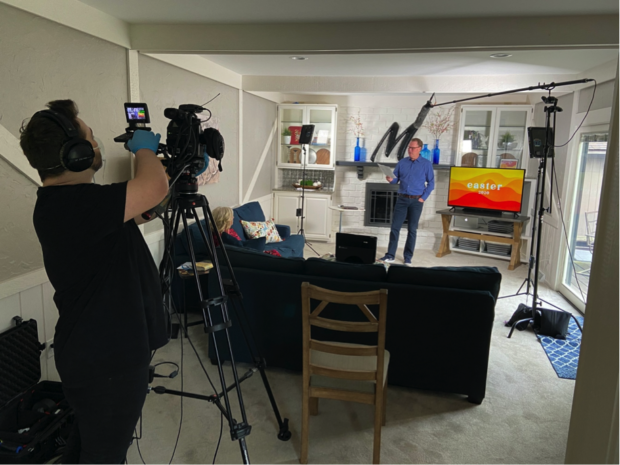
Ada Bible is learning along with the churches they’re guiding. For the first two weeks after the church closed, the clergy recorded sermons in the auditorium, splicing each part together to follow social distancing guidelines. Beginning with their Easter weekend service, the sermons were recorded by people in their own homes. Congregants joined Manion in his pristine white marble kitchen, Teaching Pastor Aaron Buer in his entryway and a three-piece praise band in a living room positioned in a triangle composed of six feet of space between each person. Pierpont said he got positive feedback from the congregation that they liked the familiarity of the being invited into their leaders’ homes. He called it, “meeting people where they are.”
For Summer Wetherbee, a 19-year-old college freshman, that’s in her pajamas. Wetherbee grew up going to in-person services at Ada Bible each week. Now, she’s been watching their weekly services on her laptop. While she hasn’t noticed a change in quality of the sermons, she does “miss seeing the smiling faces of people every Sunday.” Scott Edwards, a 67-year retired theologian and army veteran echoed this sentiment. He watches the sermons on his iPad and, like Summer, is skipping his usual church clothes for the outfit he wears to feed his horses.
On Pierpont’s end, he’s started reaching out more to congregants to create those liminal church hallway spaces online. He emailed congregants for the first time, sending out 2,300 messages. He received nearly 160 personal replies. His email opened by saying, “I wanted to let you know I miss you, and miss connecting with you as your Campus Pastor. I am thinking of you.” The message ended with his email and phone number. It was an attempt to say to people, “hit me up, if you need something or if I can be praying for you, let me know.”
He admits he’s not sure why he wasn’t emailing people before. The church building made it easier for him not to do so, but he noted that it’s a practice he’ll be sure to carry forward post-pandemic. He confessed, “[The church] will not be the same when we get back. If we get back, when we get back—we will not be the same.”
It’s taking a lot of trial and error, but Pierpont confessed, “everyone is kind of scrambling anyway.” Ada Bible is figuring out how to apply their years of virtual intimacy creation in sermons to sustained week-long connection. “Production success is all about vision, planning, preparation, and execution,” Abbott said.
They’re bringing this same rehearsal, adaptation and intention they’ve always relied on to reimagining the church in this moment, while uplifting other congregations. And, of course, they’re throwing in a dash of an ingredient that’s harder to come by in crisis—faith.
Aria for the Bounty outside my window after Sharon Olds
Reflection Through Poetry
Aria for the Bounty outside my window
after Sharon Olds
Kate Cammell | kac2261@columbia.edu
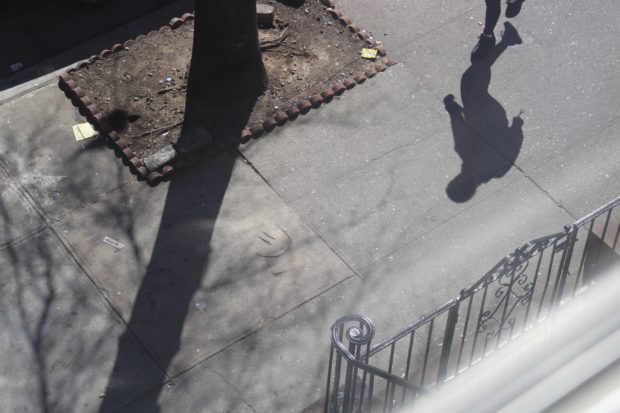
I’d never noticed that there
are twelve of them on my block, trees
with branches like varicose veins, twisted
toward sky. Their nakedness
casting soft linear shadows
on the sidewalk. When
had their leaves fallen? I’d been
so damn busy in Autumn. I
can’t even remember
what color they turned. Perhaps
orange, but I couldn’t name
the hue. Maybe a shade like
campfire or papaya innards? But
now, I suppose, I’ll have time
to watch buds appear and to make
up for not knowing
which railings birds prefer
for perching on the wrought
iron fence across the street. I
can wake up and sit
in the light of my bay window
and notice the man wearing
a corduroy jacket buttoned
halfway up, his beret tilted
slightly—it’s important
to look crisp in a crisis
I think, letting ourselves pretend
in whatever way we
can to have control, sometimes
we need that. This morning
I made coffee and drank it
out of a pale pink Ikea
mug, then I did something
unbecoming of the New
Yorker I’d convinced
myself I am, I waved to people
rolling their metal carts
down the street, having just
pillaged shelves of the Harlem
Costco one block down. I
stood inches from
the glass, to be closer
to them and so I could
taste my own breath
bouncing back at me, a reminder
that I am alive. Every so often
a car honks their horn
at the nearby intersection and I’ll let
myself believe that they’re saying
hello to me. Saying we see you
by the window and we
are in this together. I’ve
started smiling back
at the face someone carved
in wet cement, now frozen
forever on the sidewalk below
my window. Yesterday, a
man strolled by after a successful
supply run, his cart bursting
with Bounty paper towel
packaged in groups of six, nestled
in plastic covering, ready
to provide—mental manna
for indefinite isolation. The man rested
his hand atop the package, perhaps
for stability but I saw
what I wanted. And
that was a gentle touch. Like
a measure reserved for loved
ones, and it was comforting
to think of being touched
as I looked out at a street
where people were speed-walking
to the safety of a home, their
Bounty in tow
Jacuzzi Baptisms
Jacuzzi Baptisms
Kate Cammell | kac2261@columbia.edu
With the whirlpool setting off, the pastor enters a hot tub set up in the center of the church stage. One-by-one members, dressed in cotton tee shirts and athletic shorts, enter the tub for their baptism. Music swells from the praise band as the pastor guides each person through the process of dipping under water. With each dunk, the congregation erupts in applause.
This is the playbook of the monthly baptism services I grew up attending at Ada Bible, a nondenominational megachurch in Grand Rapids, Mich. Home to over 8,000 congregants, the church has four campuses scattered throughout the 200,000-person city. Each has been shuttered indefinitely as COVID-19 spreads across the nation.
These baptism services, slightly camp but moving, were always my favorites to attend. Kyle Pierpont, the Campus Pastor of the church’s Cascade Campus, often conducts the rite. He affirmed my sentiment as we talked the other day by phone saying, “yeah, people love them.”
Pierpont is a tattooed fourth-generation pastor with a grown-out brown beard and hair pulled into a bun that gives him an uncanny likeness to the Western iconography of Jesus. He’s in charge of pastoral care for the church and noted that it’s been difficult to uplift the community during this pandemic. Congregants are losing their jobs, loved ones are dying in isolation and everyone seems scared.
When Ada Bible closed its doors and went fully virtual on March 13, church leaders were hoping to reopen by Easter. Since then, the State of Michigan has enacted an executive order directing residents to stay at home through April 13, the state’s public schools are closed for the remainder of the academic year and the federal government has extended their social distancing recommendations through April 30. As of my writing this on Thursday April 2, cases in the state have risen past 9,000 and President Donald Trump is in the midst of public spat with Michigan’s governor, Gretchen Whitmer, that’s delaying medical aid to the region.
Returning to normalcy anytime soon is looking increasingly unlikely.
Ada Bible leadership is attuned to this. They’re preparing for a virtual Easter service. The church has been offering online sermons for over a decade, so adjusting to the technology and the congregation’s embrace of virtual pastoring were no problem. But still, there’s a void.
Pierpont said that he didn’t realize how much community took place in the liminal spaces of the physical building. Suddenly gone are things like saying hellos in the hallways, grabbing coffee in the atrium or striking up a conversation with the person who passes you the Half and Half. Gone also are the people who sit side-by-side as they cheer on those submerging in water on stage.
Those moments are now on hold indefinitely.
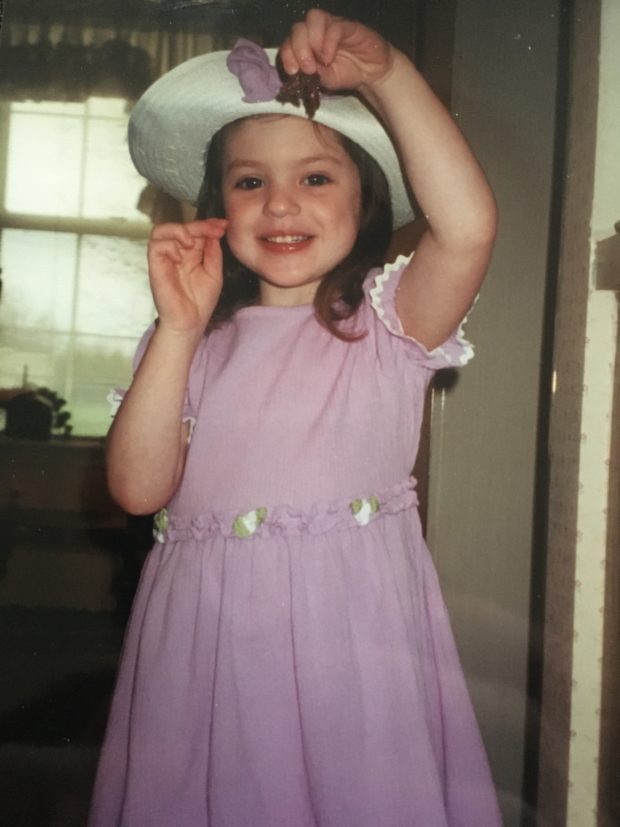
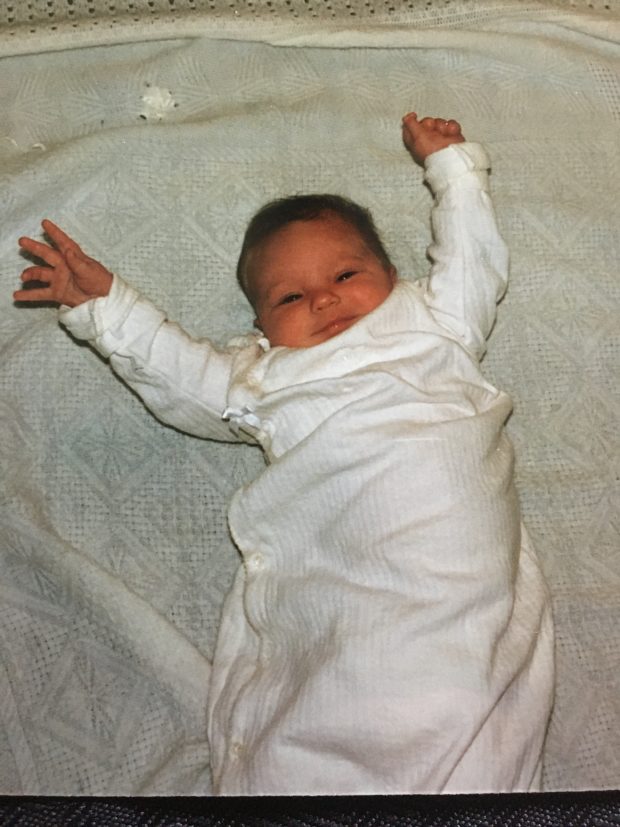
Pierpont has been thinking more lately about the meaning of baptism. Water washing away worldly sin, the act reminding those who partake that God invites them to an afterlife in heaven. On Easter he’s hoping to baptize people over Zoom. The recorded rite would then be featured during the church’s service. He thinks it’s a small way to remind people of the hope God offers even in difficult times.
While sitting at his kitchen table in front of the banana plant his wife got from Costco, Pierpont hopes to recite a blessing over Zoom as congregants dunk themselves in a body of water at their home, preferably a hot tub. Bathtubs could work too, though he confessed, “I don’t know I feel a little weird about the bathtub thing.”
Though I’m not particularly religious anymore, there’s something comforting during this time about returning to the church where I grew up, now by live stream in my East Harlem apartment. I’m stuck between needing to find meaning in this moment and wondering if I can. But I’m discovering, perhaps in an effort to etch some semblance of normalcy, moments of peace in reconnecting with a familiar community from afar.
One that I’d lost touch with until this pandemic.
Returning to church, I’m remembering that feeling of communion I had sitting at those hot tub baptisms of my youth. Cheering in chaotic unison for people as they cry and stumble off-stage smiling produces a connection that’s difficult to describe.
It’s easy for me to imagine the absurdity of it all to an outside eye—God being present in a hot tub on the pulpit of a warehouse-style church nestled in Midwestern woods. Now maybe even a clawfoot bathtub at someone’s home.
But in these moments of baptism, my church celebrates the idea that the people around us might find release and respite from the mortal world, a place where disease is real and no water can easily wash it away. As we watch the baptisms this Easter, there’s newfound hope that we might feel ourselves uplifted, too.
And, perhaps some congregants, like me, will find a much needed and special kind of levity that only comes from thinking about Jesus administering divine rescue via a Jacuzzi.
The Invitation
The Invitation
Kate Cammell | kac2261@columbia.edu
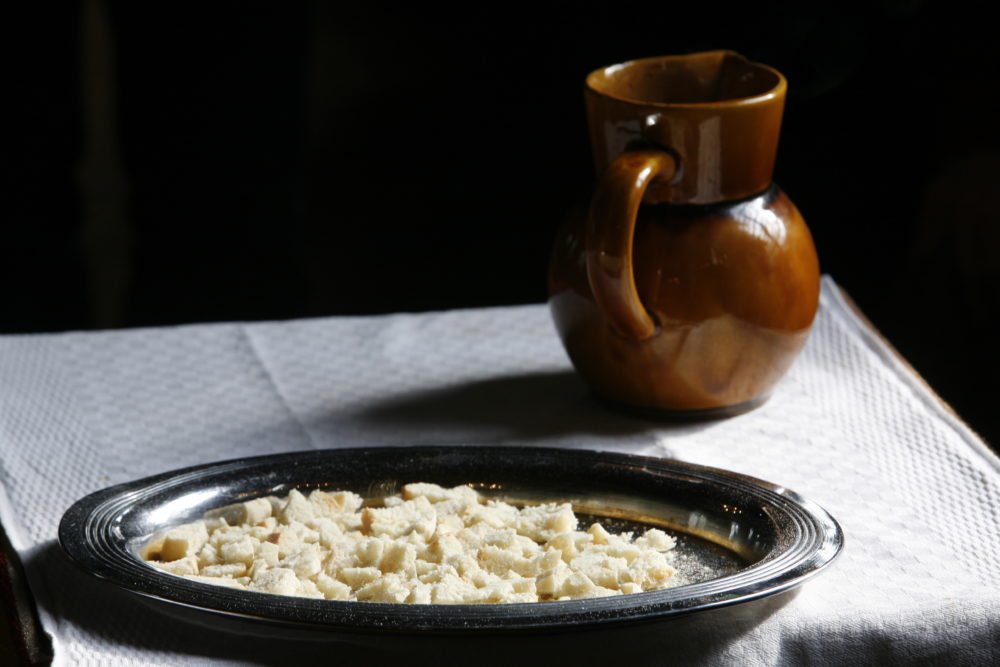
With her right hand placed over her heart and her left palm opened towards the balcony, Angela Lockett-Colas invited everyone in the church to join in the communion service. The stage lights above her shifted from ice blue to light pink and the eight-member praise band began to play a soft rock melody.
Forefront is an interdenominational church with roots in the Evangelical movement. It’s tucked along a Borem-Hill side street at 509 Atlantic Avenue. During a Sunday morning service, Lockett-Colas, Forefront’s creative director, told the congregation, “Communion is something we do because of the gift we have in Jesus Christ.” As the beat picked up tempo, she reminded the nearly 150 gathered people of the ways that Jesus suffered. “You might feel [persecuted] like that too but you’re loved. You’re loved,” she said.
As Lockett-Colas ushered congregants into the ritual, there was a fullness to her tone that felt assuring, like a mother comforting her children. She beamed as she summoned “anyone” to receive God’s love and to affirm their commitment to Him.
People stood below her on either side of the stage with wooden bowls of bread and large mason jars of red wine, symbolizing the body and blood of Christ. In the Protestant expression of Christianity, communion is a ritual where believers dip bread in wine, and as they eat the mixture they’re asked to reflect on Jesus’ sacrifice.
After Lockett-Cola spoke, members were initially slow to take communion. It was early, so people puttered, like the city buses that had ushered some there that morning. In the last row of the chapel, Georgina Orin followed her friend Grace Dowd into the aisle. Orin’s polka dotted dress sashayed on the wooden floor as she moved in time to the music. Orin, a Californian who once lived in New York, attends Forefront whenever she’s in town.
For Orin, communion is about taking a moment to think about herself in relation to the world around her. Despite the music and the whirl of the lights, there’s a stillness that believers talk about inside themselves. “I think communion is a way to remind you to nourish yourself and that you’re a part of something bigger,” she said.
After reaching the front of the line and dipping the bread in wine, Orin and Dowd made their way back down the aisle. Back at their seats, Orin rested her head on Dowd’s shoulder as they listened to the praise band. People around them raised their hands in the air and bounced on their heels, feeling the music and waiting for everyone to partake in the weekly rite.
Just in case anyone missed Lockett-Colas’s invitation, it was underscored by bold white letters on a large screen at the front of the chapel. “Communion,” the sign announced. Below that it read: “All are welcome at God’s table.” And for Forefront’s members who, like Dowd, identify as queer, seeing “all” written onscreen was key. It’s why many choose to take communion here.
Forefront became an LGBTQ-affirming church in 2014, a controversial move for an Evangelical congregation. The choice was met with loss of both members and funding, but the church stood by its choice. It’s website proudly reads, “We seek community that is inclusive of ALL people.”
Though communion is an individual practice, it’s undertaken—as its name implies—as a community. At Forefront that includes “Conventional Christians and questioning skeptics, Believers and agnostics, Women and men, those of all sexual orientations and gender identities, and Those of all classes and abilities.” It’s a church where juxtapositions are encouraged to rub shoulders.
This is reflected in the communion service as well—old tradition meets new meaning, and, for those who partake of it, a fortification with the warmth of red wine and dance on a chilly February morning in New York City.


